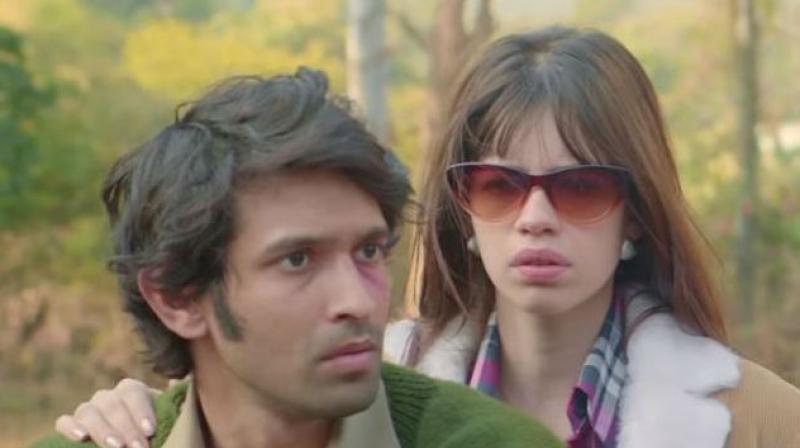A Death In The Gunj movie review: Confident in its skin
The film stars Vikrant Massey, Ranvir Shorey, Kalki Koechlin, Tillotama Shome, Gulshan Devaiah, Om Puri and Jim Sarbh in the lead roles.

Director: Konkona Sen Sharma
Cast: Vikrant Massey, Ranvir Shorey, Kalki Koechlin, Tillotama Shome, Gulshan Devaiah, Tanjua, Om Puri, Jim Sarbh, Arya Sharma
It’s uncanny how similarly attracted mother Aparna and daughter Konkona are to certain themes, characters and languages.
36 Chowringhee Lane (1981), Aparna Sen’s debut film, was mostly in English, with a sprinkling of Bengali. It told the story of a lonely Anglo-Indian teacher in Calcutta and an exploitative couple she thinks are her friends.
Konkona Sen Sharma’s directorial debut, based on a short story written by her father, Mukul Sharma, is a quietly devious film in which a timid, reticent young man, without doing much, but simply through his vulnerabilities, brings out the worst in people around him — people who are members of his extended family.
Like her mother’s debut, Konkona's first film is mostly in English, with some darling asides in Bengali.
36 Chouringhee Lane, of course, is beyond compare. That film and the performance by Jennifer Kendal stand apart from all that Aparna Sen has made since. So despite the similarities and the familial connect, it’s not fair to compare the two films.
Konkona’s A Death In The Gunj is confident in its skin, and is, in many ways a bolder film — technically and politically.
For one, its protagonist is a man who doesn’t quite fit into patriarchy, and just by being himself, exposes those around him, men and women. When was the last time you saw that on Indian screens?
Set in 1979, A Death in The Gunj begins with the climax — a body in the dickie of a Blue Ambassador that has a West Bengal number plate — and then it winds back to seven days ago, to Day 1, when Nandan (Gulshan Devaiah), his wife Bonnie (Tillotama Shome), along with their little daughter Tani, and two cousins, Mimi (Kalki Koechlin) and Shutu (Vikrant Massey), arrived in McCluskiegunj, Ranchi, for a yearend trip to the house of the senior Bakshis.
Nandan is Anupama (Tanuja) and O.P. Bakshi’s (Om Puri) son.
This flashback begins when they stop on the way at Curney's to buy cakes and bread for Rs 9 and char-anna before arriving in the house to a warm, rushed welcome. Soon they are joined by Nandan’s friends — Vikram (Ranvir Shorey) and Brian (Jim Sarbh).
Between the arrival and settling in, followed by chatter over drinks and dinner, the dynamics are clear. Shutu is the extra, the tag along, the hanger on.
Over the next six days, in this quiet, slow world where dusk slowly creeps inside the house, never quite leaving despite the lights and candles, they play several games — planchet, cards, chess, kabaddi — go on picnics and have parties.
Mostly Shutu sits in the periphery, looking in — he’s interested and craving participation, but is unsure of his place. On the few occasions when he is dragged in to participate, he gets picked on, bullied, made fun of and even beaten.
The film often stares at Shutu, while Shutu, wearing his dead Baba's hand-knitted, oversized sweater, stares at the going-ons. We see how often and how casually he is ordered around, and we catch him stealing furtive glances at Mini. We see the things he likes, and the demons he struggles with.
Though the family tree is not clear, in snatches of conversations, away from others, we pick up some gossip — about Shutu failing his PhD, ignoring his mother, about Mimi behaving just like her mother did around men.
One of the film’s many strengths is its interest in and exploration of the dynamics of couple politics.
There are several couples in the film. There’s a young, married couple with a young child who find time for quick oral sex in the afternoon. Then there’s an old married couple who have settled into two comforting, parallel rhythms of life. When they cross, there’s irritation.
There's also an adulterous couple, a brand new married couple, and a working couple — Manjari the maid and Maniya, her husband.
Shutu is coupled with Tani — he’s slightly elevated from the station of the help, but is often treated worse.
He’s often told what to do, beginning with toughening up. And the one compliment he gets from Mimi, is ambiguous. “You are so pretty, you could be a girl,” she says.
And whenever someone feels disempowered, rejected, they find some use for Shutu to get their power, mojo back.
Day 6, someone goes missing, someone falls in a ditch and is forgotten, ignored while a wolf is on the prowl.
Day 7, Shutu fails Bonnie and the only real relationship, connect he had, snaps.
A Death in The Gunj ends on a note that fits in well with McCluskiegunj — a place set in the heart of Chhota Nagpur plateau’s tribal belt, where Ernest Timothy McCluskie, an Anglo-Indian from Calcutta, carved out a homeland for 400-odd Anglo-Indians in the 1930s, complete with bakeries, hunting trips and picnics under the shade of a tree in Mrs Priscilla Perkins' yard.
This place, with its low voltage lighting and lingering memories of a world that is long gone, lends itself nicely for a touch of the spooky.

